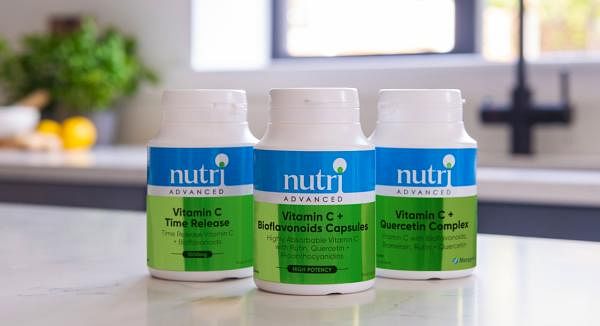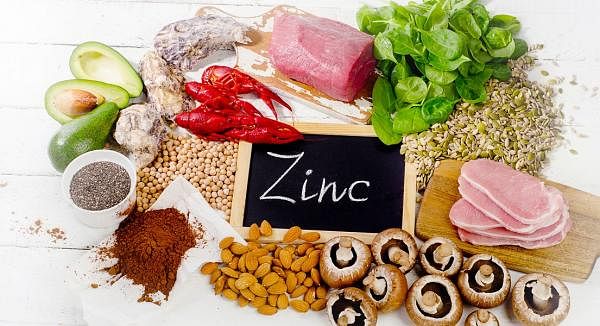How To Protect Against Colds & Coughs
Why you can trust Nutri Advanced Every article on our site is researched thoroughly by our team of highly qualified nutritionists. Find out more about our editorial process.
Top 5 nutrients to protect against coughs and colds...
The immune system is incredibly complex and has a vast array of different mechanisms in place to help protect us when seasonal bugs become more prevalent during the colder months. Nutrients have an important role to play in immune function and ensuring that we regularly keep our stores topped up is vital to support our natural defences. Here we take a closer look at 5 important nutrients that are an important part of any immune toolkit.
1. Vitamin D
Vitamin D is critical for immune health and maintaining optimal levels is vital for supporting the body’s ability to fight infection. A large 2017 study published in the British Medical Journal found vitamin D to be effective for preventing colds and flu.1 Links have also been made between vitamin D deficiency and disease severity in Covid-19. Read more on vitamin D and Covid-19 here. Unlike most essential nutrients however, you can’t rely on food to replenish stores. The main source of vitamin D is not food, but sunshine; your bare skin produces vitamin D when it comes into contact with the sun’s UV rays. It’s easy to understand then why levels often plummet during cooler months, when sunny days are scarce and skin stays covered up. The best way to keep vitamin D levels topped up is to take a daily supplement. In April 2020, Public Health England responded to growing concerns around high levels of vitamin D deficiency and increasing evidence on the vital role of vitamin D for immune function by recommending that everyone should now supplement with vitamin D daily, not just at risk groups.
Vitamin D is best supplemented as D3 (cholecalciferol) since this is the form produced naturally by the body in response to sunlight. Growing evidence suggests that vitamin D works in synergy with vitamin K and it is often recommended that they are supplemented together.
2. Beta Glucans
Less well known, yet incredibly effective immune saviours at this time of year are naturally-occurring polysaccharides known as beta glucans. They are found in bacteria and fungi and are used to make cell walls and store energy. What’s particularly interesting about beta glucans is their incredible, natural ability to modulate immune function. Wellmune® is a commercially available beta glucan extracted from the cell wall of a proprietary strain of yeast. A 2018 randomised controlled trial studied the effects of Wellmune® yeast beta glucan on immune function and found it reduced cold/flu symptoms following intense exercise.2 These effects are significant since intense exercise is known to be a risk factor for upper respiratory tract infections. This latest research confirms findings from two previous studies which demonstrated immune modulating benefits of Wellmune® in capsule form.3-4
3. Zinc
A severe deficiency of zinc is known to suppress immune function, and even mild to moderate deficiency can have a negative impact on the immune system’s ability to deal with infection. Multiple studies have shown low levels of zinc are associated with increased risk of infections such as pneumonia in elderly adults and children in developing countries.5-7 It’s certainly a nutrient you want to keep within optimal range at this time of year. The body doesn’t have much ability to store zinc so it’s crucial that your daily diet supplies plenty of this immune-supporting mineral. You’ll find high levels of zinc in meat, chickpeas & lentils, pumpkin and sesame seeds. You can also take extra zinc in supplement form to keep your levels topped up and gently support your immune function. If you regularly take zinc in supplement form however (such as in a daily multi) it is important to balance this with copper, as excess zinc can cause copper deficiency and vice versa.
4. Vitamin A
Several immune system functions rely on vitamin A and deficiency is known to impair the innate immune system8 (the non-specific ‘first line of defence’ part of the immune system). Vitamin A also regulates some genes involved in immune function. Vitamin A is found in the diet in two forms: beta-carotene (found in red, yellow and orange plant foods) and retinol, or ‘active vitamin A’ (found in high fat animal foods such as eggs, butter, liver and full fat dairy products). Beta-carotene must first be converted in the body before it can be used, hence why retinol is often referred to as ‘active vitamin A’. For targeted immune support, vitamin A is best supplemented as a mix of both retinol and beta-carotene. For ongoing support in a daily multi, it is best to stick to beta-carotene as your preferred source and include good sources of retinol in your diet.
5. Vitamin ‘R’
A lot has been talked and written about stress, and it’s no secret that chronic stress can have debilitating and widespread effects on your health. Unfortunately, the immune system doesn’t escape from the deleterious effects of stress either. Stress raises cortisol which over time can increase inflammation. Stress also decreases white blood cells leaving you more vulnerable to infections such as the common cold and flu viruses. So the final and arguably most important nutrient in our ‘Top 5’ has to be vitamin ‘R’ - our novel way of prescribing ‘Rest and Relaxation’ to everyone who wants to support their immune system this winter. You won’t find vitamin ‘R’ in a pot of multivitamins or targeted immune support, but you will find it in a good night’s sleep, a relaxing hour on the sofa, in a weekly yoga or pilates class, a regular walk in nature, a barefoot stroll on the beach, time spent offline or in a daily 10-minute mindfulness practise. However you choose to supplement vitamin ‘R’, schedule it into your week, every week, and your immune system will be eternally grateful.
Read more on practical diet and lifestyle steps you can take to support your immune system in our handy immune health fact sheet.
References:
1. Martineau AR, Joliffe DA et al. Vitamin D supplementation to prevent acute respiratory tract infections: systematic review and meta-analysis of individual participant data. BMJ 2017; 356: 16583
2. Mah, E, Kaden VN et al. Beverage containing dispersible yeast beta glucan decreases cold/flu symptomatic days after intense exercise: a randomised controlled trial. Journal of Dietary Supplements. Published online 31 Oct 2018
3.Talbott S, Talbott J. 2009. Effect of Beta 1, 3/1, 6 GLUCAN on upper respiratory tract infection symptoms and mood state in marathon athletes. J Sports Sci Med. 8(4):509–515.
4. McFarlin BK, Carpenter KC, Davidson T, McFarlin MA. 2013. Baker's yeast beta glucan supplementation increases salivary IgA and decreases cold/flu symptomatic days after intense exercise. J Diet Suppl. 10(3):171–183. doi:3109/19390211.2013.820248
5. Brooks WA, Santosham M, et al. Effect of weekly zinc supplements on incidence of pneumonia and diarrhoea in children younger than 2 years in an urban, low-income population in Bangladesh: randomised controlled trial. Lancet 2005; 366: 999 -1004.
6. Meydani SN, Barnett JB, Dallal GE, Fine BC, Jacques PF, Leka LS, et al. Serum zinc and pneumonia in nursing home elderly. Am J Clin Nutr 2007; 86:1167-73.
7. Black RE. Zinc deficiency, infectious disease and mortality in the developing world. J Nutr 2003; 133: 1485S-9S.
8. Stephensen CB, Vitamin A, infection, and immune function. Annu Rev Nutr. 2001; 21: 167-92
This website and its content is copyright of Nutri Advanced ©. All rights reserved. See our terms & conditions for more detail.
Nutri Advanced has a thorough research process and for any references included, each source is scrutinised beforehand. We aim to use the highest value source where possible, referencing peer-reviewed journals and official guidelines in the first instance before alternatives. You can learn more about how we ensure our content is accurate at time of publication on our editorial policy.
Most Popular Articles
-
7 Surprising Ways To Support Your Magnesium
If you are displaying signs of a magnesium deficiency, here are 7 ways to boost your magnesium levels that are easy to incorporate into your daily life. -
5 Best Vitamin C Supplements Picked By Our Experts
Learn more about the different types of vitamin C, the different benefits you get from different types, and what you get for spending more on a good supplement. -
Top 5 Vitamins For Energy And Tiredness Picked By Our Experts
The 5 best and most important vitamins for energy & tiredness including B vitamin food sources & best supplement forms for energy. -
Benefits of Myo-Inositol for Polycystic Ovary Syndrome (PCOS)
In this research review article, we take a closer look at a lesser-known natural compound called myo-inositol that has been found to have significant potential to improve many of the prevalent features of PCOS. -
Top 10 Reasons to Give Your Kids Omega-3
Read the top 10 reasons that kids should have plenty of Omega-3- an essential fatty acid- including for depression, brain function, sleep & reading/maths skills.
















